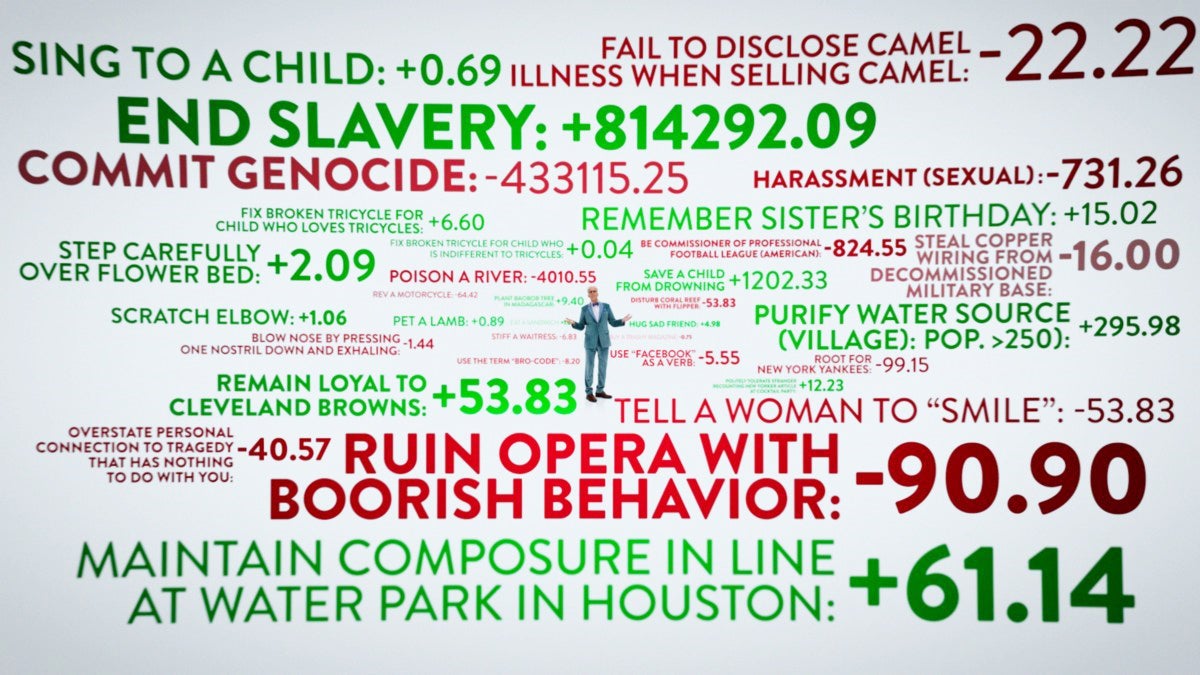Recent blog posts
Blog topics
-
Library ambassadors (80)
-
library week (2)
-
Omni (6)
-
Reno (13)
-
renovation (5)
-
staff (1)
-
Subscriptions ending (29)
Blog posts by audience
Blog posts archive
Greetings Waterloo Warriors! My name is Jahanvi Desai (she/her), and I am one of the library ambassadors this winter 2022 term. Did you know that February 14 to 18 is International Love Data Week? If you’re a fellow The Good Place enthusiast, you know that our whole lives can be measured in numbers:
Beyond these, data surrounds us more than we realize: How many hours of sleep did you get a night? How many times have you skipped breakfast this week? How many minutes do you spend waiting in a Tim Hortons' line every day?
International Love Data Week, as the name suggests, is a celebration of all things data, with the goal of raising awareness and building a community to engage on this topic. The theme for Love Data Week 2022 is Data is for everyone. I had a chance to sit down with two brilliant liaison librarians at the University of Waterloo Library to learn more about the theme and what it means to them: Agnes Zientarska-Kayko and Sandra Keys.
What does this year’s theme Data is for everyone mean to you?
Agnes: Data is for everyone to me means that anyone from various disciplines or study levels (undergraduate/graduate/professors) should have equal access to data. Everyone should be using data at a level they are comfortable with, regardless of their skills and interest space. There is a variety of data available on all kinds of topics and we can help point them to the right direction!
Sandra: In the broader sense, all data should be open and free to everyone, keeping in mind of course ethical and privacy considerations (we don't want to make health card numbers public knowledge!). An important aspect of improving data access is also providing good metadata. Details such as the subjects of the study, duration, and times when the study was conducted, are integral to make informed decisions. Knowing metadata would prevent the incorrect extrapolation of data.
What resources would you recommend to University of Waterloo students looking to access data more easily?
At the University of Waterloo:
- Statistics and Data Research Guide
- Your first stop on your journey to data access! This research guide is a compilation of the various sources you might be interested in checking out.
- Did you know? The University of Waterloo has several subscriptions that could give you access to the data you need?
- Use the StatsData email alias (available on the research guide)
- Submit any questions you might have about accessing data! Agnes and Sandra have a hoard of resources and contacts that they can point you to.
- The Geospatial Centre
- Cartographic and Geographic Information System (GIS) information is available for the Waterloo community.
- They have access to significant data resources, such as provincial environmental data, nation-wide Canadian street data, 20,000 maps and 500 atlases for countries around the world, and 55,00 aerial photographs of Southwestern Ontario.
Beyond the University of Waterloo:
- Statistics Canada (StatsCan)
- StatsCan is the national statistical office for Canada.
- Access economic, social, and environmental data from across Canada.
- ODESI
- ODESI is a web-based data retrieval system for Public Use Microdata File (PUMF) and other pre-formatted datasets from Statistics Canada.
- ODESI is made available through the Data Liberation Initiative (DLI).
- National Graduates Survey (NGS)
- Curious to see what alumni from your program are doing five years after graduation?
Our librarians reminded us of the importance of the distinction between statistics vs. data:
- Statistics refers to "a type of information obtained through mathematical operations on numerical data." (Statistics Canada, 2022).
- Whereas data are "the raw material from which information is obtained" or the "facts or figures from which conclusions can be drawn." (Statistics Canada, 2022). Data will need to be manipulated for them to be meaningful.
The most important question: Is data singular or plural? Would you say data is or data are?
The answer was unanimous: Data are PLURAL!
Believe it or not, data influences our smallest day-to-day and biggest life-altering decisions. I hope this blog post was insightful and expanded your knowledge on data and its importance. Join us in celebrating #LoveDataWeek and remember: Data is for everyone!
References
Chai, Howard. (2016). The Entire List of Actions and Their Scores On "The Good Place". Medium. Retrieved from howard-chai.medium.com/a-look-at-the-moral-point-system-of-the-good-place-7858215fd9dc
ICPSR. (2022). Love Data Week with ICPSR. Retrieved from www.icpsr.umich.edu/web/about/cms/1576





